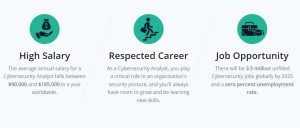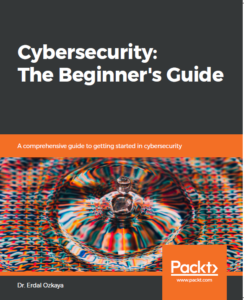
Getting into Cybersecurity via CyberNow Labs – Great opportunity in 2023
Getting into Cybersecurity via CyberNow Labs
CyberNow Labs invites YOU to join the biggest names in IT & Cyber Career Training, including the famed Mike Meyers, Gabe Schrade, Omer Arslan and Hasan Eksi as well as special guest CISO of Xcitium Dr. Erdal Ozkaya for a COMPLETE guide to how to secure your future with a new career in cybersecurity!
Join is today via the link below:
When: July 15
Time: 11 AM EST Time
Importance of Cybersecurity
In this fast-paced industry, digitization and staying connected is playing a vital role, along with the proliferation of cloud based and mobile technologies, “Why Focus on Security?” is the question which has moved from mere security team discussion to board room discussion and it didn’t stop there either, this is the talk of the industry today.
Everyone we know around us, in our workplaces or otherwise, talks about security, one way or the other. The need for security is becoming a norm in each and every aspect of what we do today in our day-to-day job, be it Functional, Development, Operational or Governance. Security is no longer just a requirement of an IT Admin, or Security Admins in an IT Organization.
It is now a requirement of all those entities who are connected and one way or other way deal with any type of data (just to bring it down to the last final bit).
Why Cybersecurity?
Cyber Crime Magazine reports there will be 3.5 million unfilled cybersecurity jobs globally by 2025, with a 0% unemployment rate; this critical need is driven by the ongoing assault of malicious attacks and data breaches.
The average annual salary for Cybersecurity Analyst falls between $90,000 and $185,000.The median annual salary is $99,000 USD, according to ZipRecruiter.
Many skills are transferrable, you don’t need an IT background to become a Cybersecurity Analyst – you need only to be open to learning.
In the U.S. market, the current cybersecurity workforce estimate is almost 805,000 and the shortage of skilled professionals is approximately 500,000.

Getting into cybersecurity
Forbes has a great article which shares what you need to do :
- Earn a Degree
About 90% of job postings in this field require a bachelor’s degree in cybersecurity, computer science or a related field. A traditional degree remains the most popular path to launching a cybersecurity career.
You can earn a bachelor’s degree in cybersecurity either online or in person. If you are not in a position to commit to a four-year degree, even an associate in cybersecurity or computer science can get your foot in the door in most cases.
- Gain Experience
You might wonder how to gain experience in cybersecurity without first landing a job in the field. To start, consider internships. An internship equips you with the practical skills and experience that employers seek. It also gives you a competitive edge over other applicants when you finally start looking for jobs.
Cybersecurity internship opportunities may be paid or unpaid, depending on the company.
Other ways to gain relevant experience include working on solo cybersecurity projects and contributing to open-source projects.
Whichever path you take, make sure to document your progress and experience. Include these details in your coding portfolio to improve your chances of getting a job.
- Obtain Certification
Cybersecurity certifications prove that your cybersecurity knowledge and experience meet stringent industry standards. These credentials can improve your marketability and earning potential as an employee.
How to get a job in cyber security with no experience
When finding your first job in a technical profession such as cybersecurity, knowing how to highlight your skills when you have little to no experience requires preparation. If you’re considering a cybersecurity career, you might benefit from learning how to approach your first job search.
In this article, we review what cybersecurity jobs are and we provide examples, tips and steps to help you land your first cybersecurity position.
Here are some steps you can take to get a job in cybersecurity without prior professional experience:
1. Determine your level of preparation
Many individuals beginning their careers in cybersecurity have substantial educational experience in computer science or computer engineering, while others transition into the field from another academic or professional discipline. Your previous exposure to mathematics, coding, systems analysis and IT all affect your initial preparedness. It’s important you understand your present skill sets so you can determine which cybersecurity jobs align with your background and identify the material you need to study before applying to them.
2. Identify your preferred career path
Along with your educational qualifications and skills learned in other professions, your career aspirations inform your job search. Choosing a career path that you genuinely want to pursue can provide motivation that makes studying and practicing new skill sets more enjoyable. It also enables you to research the requirements for each job title so you can tailor your preparations for maximum effectiveness.
3. Access resources to complement your knowledge
Once you’ve identified the jobs you want to apply for, you can better identify which resources you need to consult. For instance, if you decided to work as an incident responder, you would emphasize learning hacking, the basis of penetration testing. Since hacking is a complex skill that requires time and effort to learn, you’d orient your research and education around it. Here are some key tools you can use to enhance your understanding of cybersecurity:
-
Books and online articles
-
Industry publications, such as magazines and blogs
-
Online or in-person courses
-
Professional organizations or online communities
-
Industry trade shows
4. Experiment with your skills
Many cybersecurity skills require extensive practice to develop. Fortunately, you have several options for how to learn critical capabilities. To begin, make sure you have a computer setup that enables you to work with all major operating systems so that it can serve as your primary learning device. Here are the technical skills cybersecurity professionals have at least some expertise in:
-
Coding: Having a basic knowledge of different coding languages empowers you to understand how applications and websites function and how they become compromised. Most commonly, cybersecurity professionals learn languages such as Python, Javascript, PHP, HTML, C and C++.
-
Systems: Systems are the foundation of the IT infrastructures that cybersecurity professionals oversee. Learn how to navigate desktop, mobile and laptop interfaces and the various operating systems that power them.
-
Networking: Networks form the basis of data exchange between computers. These essential features of IT architecture are also common points of attack for cybercriminals.
-
Applications: Software and other applications are resources that can enhance cybersecurity or become liabilities for cybercriminals to exploit. It’s important that you know the basics of configuring and maintaining the applications that support data storage, communication and internet connectivity.
-
Hacking: Cybersecurity professionals study hacking so that they can adopt the perspective of a cybercriminal and understand the weaknesses in a security setup.
For each of these topics, you can find dedicated resources that allow you to experiment with them. For instance, several online platforms allow you to practice network security testing, coding, penetration testing and hacking. These resources often present challenges with different levels of difficulty, so you progressively test your abilities. Once proficient, you can also analyze your home network and study how your internet-connected devices communicate and transmit information.
5. Pursue certification
Certifications give employers confidence that they can trust you to protect their operations and sensitive information. They’re available for individuals of all skill levels and are often relatively low cost. Many of the entry-level ones are available online and don’t have eligibility requirements aside from the payment of a fee. Professionals entering the cybersecurity field often choose to:
-
Pass the Microsoft Technology Association Security Fundamentals exam
-
Earn the Information Systems Audit and Control Association CSX Cybersecurity Fundamentals introductory certificate
-
Earn the Computing Technology Industry Association Security+ entry-level certification
6. Apply to entry-level openings
Having learned the core skills and concepts that define cybersecurity and proven your capabilities with certification, you are qualified to apply for entry-level jobs in the field. The increasing threat of cyberattacks has created a massive demand for cybersecurity professionals, so you can expect to find many employers willing to hire you as long as you can demonstrate your skills and knowledge. Be sure to sustain a continued effort in studying the latest cybersecurity trends so that you’re prepared to help organizations overcome the most pressing issues they face.
For more webinars, click here
CyberNow Labs is the right place to start your career:

Keywords
getting into cybersecurity – how to get a job in cyber security with no experience – how to get into cyber security as a beginner – Getting into Cybersecurity via CyberNow Labs – Is cyber security hard to get into?





